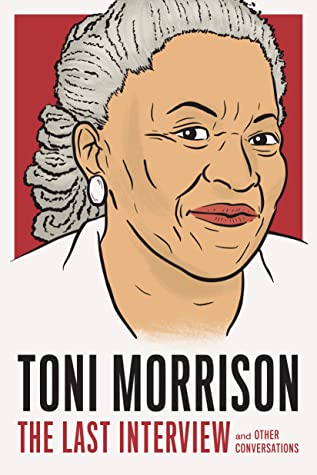Sometimes I resist endings. Even in these days of binge-watching, I occasionally leave the final episode of a long-running TV series unwatched.
So this series of books, spiralling around the concept of a final interview, isn’t one to which I’ve naturally gravitated.
But because I found the Ursula K. Le Guin volume thoroughly enjoyable, and because she and Toni Morrison are both authors on my MustReadEverything lists, I braced myself for the sense of an ending, and picked up this book.
The collection (for it’s not actually a single, final interview) begins with a 1986 interview with Donald M. Suggs Jr, via River Styx, in 1986. More than thirty years ago, and there is Toni Morrison is saying something that still needs saying today:
“The idea of ideological slaughter of the other is chewing up everybody’s intelligence. People are making the most unbelievable statements about the other based on that kind of insistence that the person who disagrees with you fundamentally can’t exist. These are political statements as well as biological and everything else. The hierarchy being established is what’s problematic.”
Of course, since then, Morrison has written so much about Others and Othering that she is recognized as an authority on the subject. It’s interesting to reflect, however, on her having worked on this theme throughout her career. It’s also inspirational, urging us to revisit, to reconsider, to reevaluate how we manage and navigate disagreement, both on and off the page.
And, in case we needed another reminder of the hard work that being a writer requires, a 1987 interview with Charlayne Hunter-Gault on PBS Newshour offers this: “Serious writers write things that compel them, new challenges, new situations, and a new landscape that they have not been in before.”
She issues this regarding Beloved (“Capturing a Mother’s ‘compulsion’ to Nurture”), which reminds me that I should reread. Here’s a comment from a later essay which nudges me even further towards that reread: “I hadn’t felt that—it must have been a combination of happiness and something else. And it was then that I wrote Beloved. It was all like a flood when I wrote that book.”
Another element which really struck me, given one specific slant of Othering that frequently occurs, is her support of and excitement about the work that younger writers were and would do. In The Salon Interview by Zia Jaffrey for Salon on February 3, 1998, she shares this hopeful view:
“They will write infinitely better than I do. They will write of all sorts of things that no one writer can ever touch. They will be stronger, and they will be delicious to read. But part of that availability and accessibility is because six or seven black women writers, among whom I am one, have already been there and tilled the soil.”
Reminding readers of the reciprocal relations between generations, yes, but simultaneously reminding us that her work was truly pivotal in creating a space for Black women writers in the American literary landscape.
Her accomplishments did not, however, give her permission to slack. In the National Visionary Leadership Project Video Interview with Camille O Cosby on November 5, 2004, she elaborates on the idea of being a serious writer. “I’m just trying to look at something without blinking, to see what it was like, or it could have been like, and how that had something to do with the way we live now. Novels are always inquiries for me.”
Also of interest, particularly given my recent reading of Lennie Goodings’ memoir about working in the publishing industry, was Morrison’s experience editing. She was a powerful force on that scene, but even there she faced some limitations.
Despite her support of the novelist Leon Forrest’s work, for instance, after she insisted on publishing a few books (three, I believe) that were not commercially successful, she faced censure. “Now that they did not let me keep on publishing—books that weren’t making any money. Although at one time in publishing you could do that…”
One last quotation, which explores how revision intersects with reading and rereading: “I think one of the reasons I’m so thrilled with writing is because it is an act of reading for me at the same time, which is why my revisions are so sustained. Because I’m reading it. I’m there. Intimacy is extremely important to me and I want it to be extremely important to the readers, too.”
It’s a challenge for me, daily, to keep my focus on writing rather than reading. When I need encouragement, I’ll think about this way of reframing the process. And perhaps I’ll work on another few pages of revision, rather than reading another few pages of someone else’s revisions.
Great stuff for writers.
Toni Morrison. The Last Interview. Ed. Nikki Giovanni. New York: Melville House, 2020.

